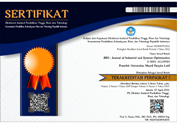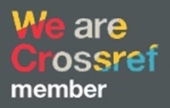PENGARUH STRATEGI GREEN BUSINESS DAN PERILAKU KONSUMEN TERHADAP VOLUME PENJUALAN YANG DIMEDIASI KEUNGGULAN BERSAING PRODUK
(STUDI KASUS COFFEE POINT DI KEC.WIYUNG)
DOI:
https://doi.org/10.51804/jiso.v7i2.47-53Keywords:
Strategi Green Business, Perilaku Konsumen, Volume Penjualan, Keunggulan Bersaing ProdukAbstract
ABSTRAK
Tujuan penelitian ini adalah untuk mengetahui dan menganalisa pengaruh strategi green business dan perilaku konsumen terhadap volume penjualan yang di mediasi keunggulan bersaing produk pada Point Coffee. Populasi dari penelitian ini adalah konsumen dari point coffee. Dengan teknik pengambilan sampel nonprobability sampling serta penentuan sampel menggunakan metode purposive sampling sehingga memperoleh jumlah sampel 100 responden. Teknik analisa data pada penelitian ini menggunakan teknik Partial Leaast Square (PLS) dengan melakukan pengujian evaluasi outer model dan inner model untuk pengujian hipotesis. Hasil penelitian menunjukkan bahwa strategi green business dan perilaku konsumen berpengruh positif dan sgnifikan terhadap volume penjualan. Keunggulan bersaing produk juga memiliki peran dalam memmediasi strategi green business dan perrilaku konsumen.
Abstract
The purpose of this study was to determine and analyze the influence of green business strategies and consumer behavior on sales volume mediated by product competitive advantage at Point Coffee. The population of this study were consumers of Point Coffee. With a nonprobability sampling technique and sample determination using the purposive sampling method, the sample size was 100 respondents. The data analysis technique in this study used the Partial Leaast Square (PLS) technique by conducting an evaluation test of the outer model and inner model for hypothesis testing. The results showed that green business strategies and consumer behavior had a positive and significant effect on sales volume. Product competitive advantage also plays a role in mediating green business strategies and consumer behavior.
References
Ameur, H. Ben, Han, X., Liu, Z., & Peillex, J. (2022). When did global warming start? A new baseline for carbon budgeting. Economic Modelling, 116, 106005. https://doi.org/10.1016/j.econmod.2022.106005
Basu Swasta. (2017). Volume Penjualan.
Cen Lu Lay, Ika Gunawan, Felicia Abednego, & Shirleen Natasha. (2021). Pengaruh Cause Related Marketing Terhadap Trust In Cause Related Marketing Dan Brand Loyalty. Jurnal E-Bis (Ekonomi-Bisnis), 5(2), 409–424. https://doi.org/10.37339/e-bis.v5i2.540
Gracya Pramudita Putri, A., Studi, P. S., Ekonomi dan Bisnis, F., PGRI Palembang Jl Ahmad Yani Lr Gotong Royong, U., Selatan, S., Lilianti, E., & Ahmad Yani Lr Gotong Royong, J. (2022). Analisis Faktor-Faktor yang Memengaruhi Volume Penjualan pada Perusahaan Subsektor Rokok yang Terdaftar di Bursa Efek Indonesia Panca Satria Putra 3. 14(2), 187–197.
Heri Setiawan. (2014). Keunggulan Bersaing Produk .
Kotler&Keller. (2020). Perilaku Konsumen.
Li, Z., Rasool, S., Cavus, M. F., & Shahid, W. (2024). Sustaining the future: How green capabilities and digitalization drive sustainability in modern business. Heliyon, e24158. https://doi.org/10.1016/j.heliyon.2024.e24158
Maharani, S. N. (2015). SUSTAINABILITY REPORTING SEBAGAI MEDIA PERUSAHAAN DALAM MENGEMBANGKAN DAN MELAPORKAN KEBIJAKAN BISNIS BERKELANJUTAN. Jurnal Ekonomi MODERNISASI, 10(1), 11. https://doi.org/10.21067/jem.v10i1.770
Nugroho. (2017). Perilaku Konsumen. Jakarta:Predana Media.
Porter. (2016). Arianty.
Priyanto, A., Aslichati, L., & Kuncoro, S. (2012). The Custom Made Strategy of “Satu Kayu Desain Enterprise” in Efforting to Achieve Sustainable Competitive Advantage. Procedia Economics and Finance, 4, 54–58. https://doi.org/10.1016/s2212-5671(12)00320-6
Shulbi Muthi. (2024). PERILAKU KONSUMEN MASA KINI?: TREN KONSUMTIF DI ERA PASAR GLOBAL. Konferensi Nasional Ekonomi, Bisnis Dan Studi Islam.
Sohns, T. M., Aysolmaz, B., Figge, L., & Joshi, A. (2023). Green business process management for business sustainability: A case study of manufacturing small and medium-sized enterprises (SMEs) from Germany. Journal of Cleaner Production, 401. https://doi.org/10.1016/j.jclepro.2023.136667
Downloads
Published
Issue
Section
License
Copyright (c) 2024 JISO : Journal of Industrial and Systems Optimization

This work is licensed under a Creative Commons Attribution-ShareAlike 4.0 International License.
With the receipt of the article by JISO Editorial Board and the decision to be published, the copyright regarding the article will be transferred to JISO. The copyright transfer form can be downloaded here.
JISO has the right to multiply and distribute the article and every author is not allowed to publish the same article that was published in this journal.
JISO is licensed under a Creative Commons Attribution-ShareAlike 4.0 International License.
Under the following terms:
Attribution — You must give appropriate credit, provide a link to the license, and indicate if changes were made. You may do so in any reasonable manner, but not in any way that suggests the licensor endorses you or your use.
ShareAlike — If you remix, transform, or build upon the material, you must distribute your contributions under the same license as the original.














